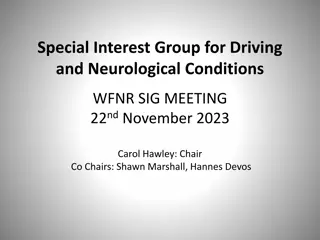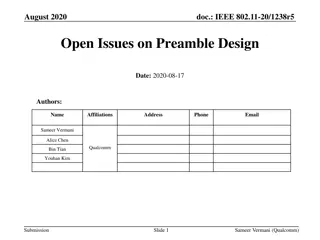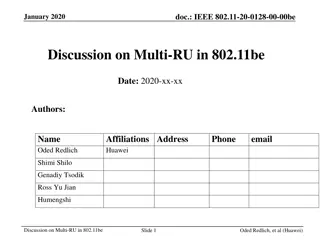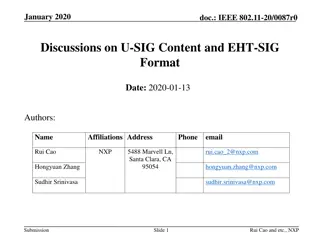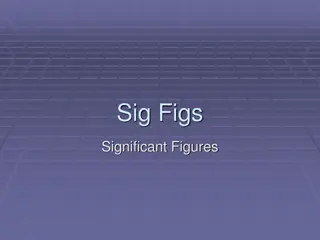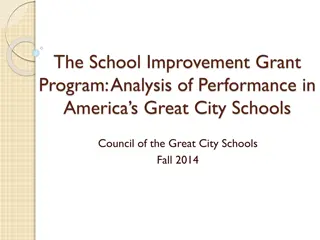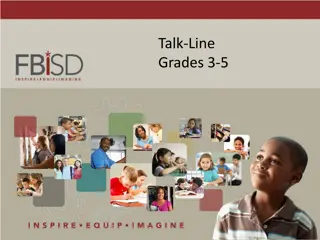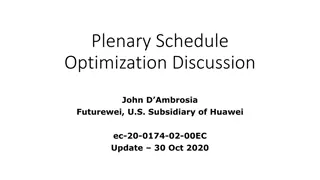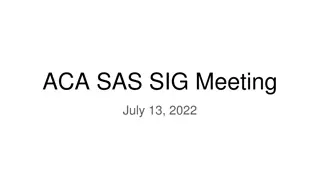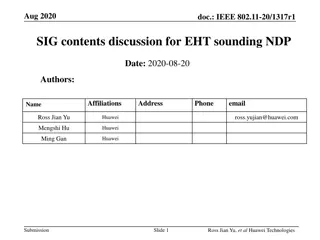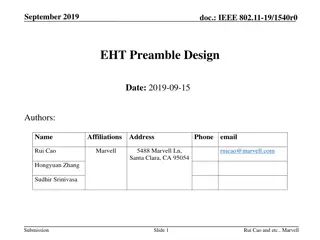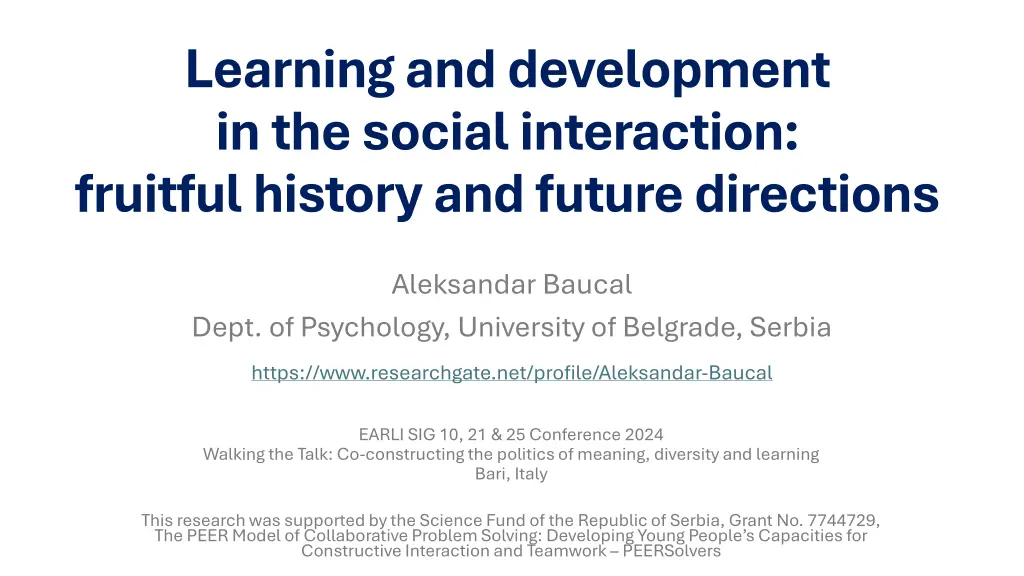
Emergence of Learning and Development through Social Interaction
Explore the fruitful history and future directions of learning and development in social interaction, focusing on collaborative problem-solving, human development approaches, and societal relevance. Delve into the theoretical, methodological, practical, social, political, and cultural aspects that make this field intriguing and promising. Unravel the evolution from cognitive to social issues, including peer interaction, adult-child dynamics, classroom practices, and the impact of technology. Discover the never-ending story of social collaboration and its implications in diverse contexts.
Download Presentation

Please find below an Image/Link to download the presentation.
The content on the website is provided AS IS for your information and personal use only. It may not be sold, licensed, or shared on other websites without obtaining consent from the author. If you encounter any issues during the download, it is possible that the publisher has removed the file from their server.
You are allowed to download the files provided on this website for personal or commercial use, subject to the condition that they are used lawfully. All files are the property of their respective owners.
The content on the website is provided AS IS for your information and personal use only. It may not be sold, licensed, or shared on other websites without obtaining consent from the author.
E N D
Presentation Transcript
Learning and development in the social interaction: fruitful history and future directions Aleksandar Baucal Dept. of Psychology, University of Belgrade, Serbia https://www.researchgate.net/profile/Aleksandar-Baucal EARLI SIG 10, 21 & 25 Conference 2024 Walking the Talk: Co-constructing the politics of meaning, diversity and learning Bari, Italy This research was supported by the Science Fund of the Republic of Serbia, Grant No. 7744729, The PEER Model of Collaborative Problem Solving: Developing Young People s Capacities for Constructive Interaction and Teamwork PEERSolvers
What am I puzzled with? Under what conditions and in what way learning and development could emerge during a situated collaboration with others?
Why is it so interesting to me? Theoretical relevance (individual vs sociocultural approaches to human development) Methodological relevance (interaction as a topic and as a tool, quantitative and qualitative approach) Practical relevance for the education Social relevance (ensuring social participation of excluded, marginalized, segregated, discriminated equal opportunities for all) Political relevance (dialogue in the time of polarizations) Cultural relevance in the time of cultural wars Relevance for globalized world with intensive migrations
It seems like a promising field of inquiry At the beginning, there were many open questions with a hope that they will be clarified based on research studies It seems just as a matter of time and several studies to get good answers, but
Historical perspective Piaget vs Vygotsky: peer interaction (symmetric and asymmetric) and adult- child interaction Parent-child interaction at home and during participation in socially and culturally relevant practices Adult-child and child-child interaction embedded into socio-culturally relevant practices Classroom interaction (teachers-students, students-students) Project based learning and problem-based learning as an educational practices Technological turn (CSCL and interaction via digital technologies) Materiality turn Interaction focused on well defined problems -> interaction focused on ill defined problems From mostly cognitive problems to social issues and hot issues Peer interaction and intergroup relationships (e.g., in post conflict societies) Rising interest into interaction with robots and AI
Amarcord: reflection upon research experience with the topic https://www.researchgate.net/profile/Aleksandar-Baucal
Adult-child interaction over Raven matrices Primary school children (app. 9 years old) Experimental study (pretest posttest) RQ: Is it possible to improve fluid intelligence based on different predesigned modes of scaffolding provided by an adult scaffolding provided by an adult experimenter (motivational-emotional, and cognitive support)? Key finding: It is possible to improve results significantly based on both types of support (motivational and cognitive) Insight: there are two ZPDs ( Piagetian and Vygotskian ) Insight: positioning is important some children tend to adopt a passive position in interaction with adult experimenter
Peer interaction over Raven matrices Primary school children (app. 9 years old) Experimental study (pretest posttest) RQ: Is it possible to improve fluid intelligence based on a symmetric peer interaction symmetric peer interaction? Key finding: it is possible, but some methodological limitations become more visible Insights: limitation of methodology -> IRT needs to be included Insights: peer interaction in the school is related to the cheating (what peer interaction does it mean in a specific context?)
Adult-child interaction and Piagets conservation task Students 6-7 years old (in between Piagetian pre-operational and concrete operational stage of development) Experimental study (pretest posttest) RQ: Is it possible for children to construct CO reasoning in interaction with an adult experimenter providing scaffolding in adult experimenter providing scaffolding in the ZPD the ZPD? Finding: nice designed experiment goes to the local community and fail but it provided some new insights Insight: need for an ethnographic perspective Insight: need for mixed method (combining experimental design with qualitative study on selected cases)
Peer interaction and Piagets formal operational reasoning Middle school students (younger and older group) Mixed method: experimental study (pretest-posttest) and detailed analysis of specific cases RQ: Is it possible to co-construct formal-operational thinking in an asymmetric peer interaction asymmetric peer interaction Finding: it is possible when students establish a productive and argumentative dialogue, but there are also some developmental constraints Insight: there are different ways how students can learn a more sophisticated way of reasoning together with a more competent peer
Peer interaction and early reading competence Primary school children Mixed method: experimental study (pretest-posttest) and detailed analysis of specific cases RQ: How could students develop their reading competence in the symmetric peer interaction symmetric peer interaction? Finding: co-construction of knowledge is possible in different ways and under specific conditions Insights: group assessment underestimate children competence IRT can help, but in a limited way -> research design needs to be modified Insights: social status in the peer group matters, power relationships matter, role of objects in the peer interaction (e.g., pencil)
Street children interaction with adult in situation of testing (Kohs cubes) Street children from Drop-in center Mixed method RQ: Is it possible for street children to improve their results in Kohs cube test based on different modes of scaffolding in the ZPD provided by adult experimenter ZPD provided by adult experimenter? Finding: many street children improve their results significantly only with motivational-emotional support (encouragement) Insight: street children are not interested - testing situation and practice is not meaningful for them, but it can be renegotiated Insight: typical research practices seem to be seen as middle class practices, so it affects their positioning and participation scaffolding in the
Peer interaction and PISA Several studies with upper secondary students (14-15 years old) Mixed method -> more ecological research design RQ: why some students have difficulties with PISA items and how they can improve their understanding and reasoning? Findings: (a) wrong items can be result of lack of motivation, lack of understanding, and lack of competence, and (b) students improve their reasoning in different ways in peer interaction and interaction with adult Insight: ecologically more valid research design is needed Insight: using of external resources (others and internet) is understood as cheating (socio-cultural meaning of some practice)
Peer interaction and risk-taking decisions Primary school students (10 years old) Mixed method RQ: How symmetric peer discussion symmetric peer discussion about risk-taking decisions could affect individual decision making Findings: having discussion with peers on risk-taking decision tend to affect students to prefer less risky decision, but some students tend to adopt a riskier decision Insight: need for a change in focus - from mostly cognitive domains (with correct answers) to other domains/problems with no correct answer and problem engaging values, identities, emotions etc. ( hot issues)
Ongoing research project: PEERSolvers (funded by Science Fund of Republic of Serbia)
What makes peer collaborative problem solving (un)productive? Qualitative systematic review: Educational Research Review (https://doi.org/10.1016/j.edurev.2023.100567 ) 1. Six aspects of collaboration make a difference: socio-cognitive aspects socio-emotional aspects the quality of task/problem-solving strategies regulation of group activity oriented towards the task regulation of relationships between group members participant engagement in CPS 2. Productive collaboration is possible, but student need support to improve their capacity to establish and maintain a productive collaboration => development of PEER training development of PEER training
PEER training: 4 components P P Personality: improving student understanding how different personalities can contribute to productive group collaboration and collaborative problem solving (CPS) E E Exchange: improve capacities of students to establish a productive dialogues and discussion (socio-cognitive dimensions of collaboration) E E Emotional intelligence: improve capacities of students to establish a productive socio-emotional relationships R R Resources: improve capacities of students to use digital resources in a productive and responsible way
PEER training: an announcement Day 2 (Thursday, 12th September, 11-12.30) Room: Aula Leogrande 5A SIG 10 invited symposium: Co- constructing meaning about teaching and learning: How to make research findings matter?
PEERSolvers: key findings of the Study 1 (in review) RQ: Does PEER training has capacity to improve (a) quality of collaboration among upper secondary students and (b) quality of their proposed solutions for selected socio-scientific issues (ill defined issues relevant for students and society) Key findings: PEER training improved quality of collaboration significantly (except for socio-emotional dimension that was close to the significant level) PEER training improved quality of proposed solutions for given socio- scientific issue Effect of PEER training on the quality of product is mediated completely by the socio-cognitive dimension, and partially by other dimensions
PEERSolvers: key findings of the Study 2 (in preparation) RQ: Does PEER training has capacity to improve individual competences (science and civic) through improvement of quality of collaboration in joint reflection over complex science and civic items (borrowed from PISA and ICCS international studies) Preliminary findings: Participation in the PEER training have a positive effect on posttest achievements of students on science and civic competences (the effect is lower for the civic competence) The effect of the PEER training on individual competences is mediated by improvement of the quality of collaboration among students (completely or partially)
Chilling move toward hot issues: peer interaction upon disputed historical narratives Upper secondary students from two communities with history of conflicts (Muslim minority living in Serbia and Serbian community) Students from two communities are invited to reflect upon disputed historical narratives on some mutual conflict and they get scaffolding provided by researcher (both with respect to productive collaboration and historical reasoning) RQ: Would it be possible for students to establish a productive collaboration and to build a joint multi-perspective narrative? What kind of collaboration could enable students to distance themselves from their narratives ( truth ) and to jointly create a multi-perspective narrative?
Neverending story with increasing complexity By time and after many research studies, we learn a lot, but the number of open issues just increased as well as their complexity Moreover, it s becoming clear that relationship between theory, research, and practice are more complex
Increasing complexity Task and its meaning Motivation /Purposes To be added Context personal Identities Actors Context institutional Objects Context social and cultural Tools and technologies Micro and macro time dimensions Context political Relationships
Increasing complexity Context personal Context institutional Purpose Actors Context social and cultural Tools Micro and macro time dimensions Context political Relationships
Challenging future Differentiation of the research field creates such big diversity => is it worth to treat this field of inquiry as single research field? Epistemological tensions: exploratory vs. analytic approach Tensions between quantitative and qualitative approach Challenges related with studying hot issues Challenges related with implementation/enactment in the education and scaling up Challenges related with the dominant educational practices and context Challenges related with the dominant education policies Challenges with believes and values related to collaboration
Thank you for your attention! Comments and questions





